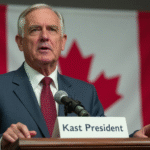Background on the Situation
The United States government is nearing a partial shutdown of public sector functions due to the division in Congress regarding the approval of the Federal Spending Bill. Analysts from global bank UBS estimate that major disruptions are unlikely, even if the deadline passes without a legislative agreement.
Key Deadlines and Potential Impact
The deadline for Congress to approve part of the bill is Tuesday, September 30th at midnight. Although there’s a possibility of a last-minute agreement, no signs indicate an imminent alliance to resolve the risk. Without a late-hour deal, approximately one-quarter of federal spending would be affected, leading to furloughed federal employees and delayed salary payments. This includes discretionary categories such as education, transportation, and defense.
Historical Context and UBS Analyst Perspective
UBS analysts mentioned that past administrative shutdowns have caused moderate and short-term market volatility in stocks and bonds. They emphasized that macroeconomic effects are typically minimal and quickly reversed, with the economy and markets generally experiencing only limited interruption that recovers once government operations resume.
Monetary Policy and Data Collection
UBS experts stated that a partial government shutdown wouldn’t impact the Federal Open Market Committee’s (FOMC) monetary decision scheduled for October 28th and 29th. Although there might be a temporary delay in collecting and publishing most economic data, such as employment and unemployment reports, it wouldn’t affect Fed surveys like the Beige Book.
Democratic Concerns and Previous Shutdown
The main point of contention for Senate Democrats remains the extension of tax credits for health insurance risk premiums. During President Donald Trump’s first term in 2018, a 35-day shutdown began on December 22nd of that year. Market volatility was more influenced by expected Fed interest rate hikes rather than the operational budgetary shutdown, according to UBS analysts.
Partisan Control and Legislative Hurdles
Despite the Republican Party, led by Donald Trump, controlling both the House of Representatives and the Senate, at least seven Democratic votes are required to pass spending legislation.
Key Questions and Answers
- What is the deadline for the Federal Spending Bill approval? The deadline is Tuesday, September 30th at midnight.
- What percentage of federal spending would be affected by a shutdown? Approximately one-quarter of federal spending would be impacted.
- How would a shutdown affect federal employees? Federal employees would be furloughed, and their salary payments would be delayed.
- Would a shutdown impact the FOMC’s monetary decision? No, according to UBS analysts, a partial government shutdown wouldn’t affect the FOMC’s decision.
- What are Democrats’ main concerns regarding the spending bill? Democrats are primarily concerned with extending tax credits for health insurance risk premiums.
- How did the 2018 shutdown influence market volatility? Market volatility in 2018 was more influenced by expected Fed interest rate hikes rather than the operational budgetary shutdown.
- How many Democratic votes are needed to pass spending legislation? At least seven Democratic votes are required.






